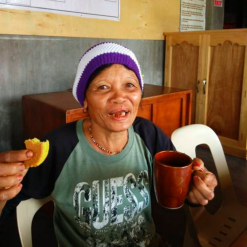The agriculture sector relies on women in many different ways. Despite their contributions in the agricultural workforce, however, women are not given equal access to resources. For instance, of the 3 million landowners in Asia, only 12 per cent are women. Given equal access to resources, women can increase their yield by up to 30 per cent, which can feed 150 million unnourished people in the world.

Reversing the marginalisation of small-scale producers, particularly of women, entails a concerted effort to change the current mindsets and practices in agricultural value chains (AVCs) that (1) focus purely on enterprise growth and profits, (2) engage small producers in purely transactional terms, (3) drive down the prices of agricultural produce to the lowest possible levels regardless of environmental and social impact, and (4) relegate women as invisible players.
There are many agriculture-focused social enterprise initiatives in various value chains in Southeast Asia, but information is scant on how these have changed the lives of small-scale producers, especially women. The entry of impact investors and inclusive businesses in AVCs has opened up opportunities for scaling up impact on smallholder producers. However, it has also posed conflicts and difficulties due to the lack of knowledge and understanding of the requirements for effective engagements and the role of the government in providing an enabling environment and ecosystem for investments to help eradicate poverty, address inequality, and achieve women’s empowerment.
Through this lens, the Gender Transformative and Responsible Agribusiness Investments in South East Asia (GRAISEA) Programme works to promote women economic empowerment in different AVCs. With the Institute for Social Entrepreneurship in Asia (ISEA) and its partners, GRAISEA documented the following stories of women empowered through transformational partnerships.
In the Philippines, Juanita Mamo was once a voiceless indigenous woman who came from a male-dominated tribe. After being capacitated and involved in community and economic work in the community, Juanita is now the elected chairperson of the Council of Elders of the Kulaman Manobo Dulangan Organization (KMDO)—a partner indigenous people’s organisation of TRICOM and Sultan Kudarat Coffee Ventures Inc. (SKCVI). Through SKCVI, Juanita and other women and men members of the Dulangan tribe were engaged in the production, processing, and marketing of Kape Dulangan, their own brand of coffee, to a growing local market, as part of their Ancestral Domain Development Plan. SKCVI is one of more than 50 community-based coffee enterprises comprising the Philippine Coffee Alliance, which is led and assisted by Bote Central with their Coffee for Life Program.
In Thailand, Pin heads the fish processing and slicing group of the Association of Thai Fisherfolk Federation’s Fisherfolk Enterprise, which was assisted by Oxfam in developing the Blue Brand of responsibly fished, formalin-free seafood. With the Blue Brand in place, fishers are able to earn up to 100 per cent more. Currently, Pin is training women fishers to ensure they produce quality and standardised Blue Brand products that can be marketed through the Fisherfolk Shops and Lemon Farm—a Bangkok-based social enterprise chain of groceries.

Culled from these concrete stories, ISEA and its partners were able to formulate and continuously promote the benchmarks for transformational partnerships in AVCs. These benchmarks include the following:
Promote appropriate technology and community-based/oriented innovations that are friendly to women and men small-scale producers, and contribute to sustainable consumption and production.
Progressively position women and men small-scale producers to reap a more substantive share of value created over time, while building their resilience to natural, social, and economic disasters.
Pave the way for the empowerment of women and men small-scale producers to become actors in their own development and that of their community and sector, and to become stewards of the natural resource base sustaining their livelihoods.
Provide a combination of transactional and transformational services among women and men small-scale producers to more effectively participate in value chain and in community/ sectoral development that is both equitable and sustainable.
Proactively choose value chains and invest in value chain development practices that enhance women’s participation and empowerment. 6. Produce measurable outcomes of transformation at the level of women and men small-scale producers, households, and communities, and value chains and subsectors.
These benchmarks define a pathway that helps resolve the development paradox of economic growth that has failed to address poverty, has increased inequality, and has worsened prospects for sustainability in many developing countries in South East Asia. Likewise, they are aspirational standards that aim to build a critical mass of empowered grassroots women like Juanita, Imelda, and Pin.
###
Credits to ISEA. Click HERE to view the original article.


Comentários